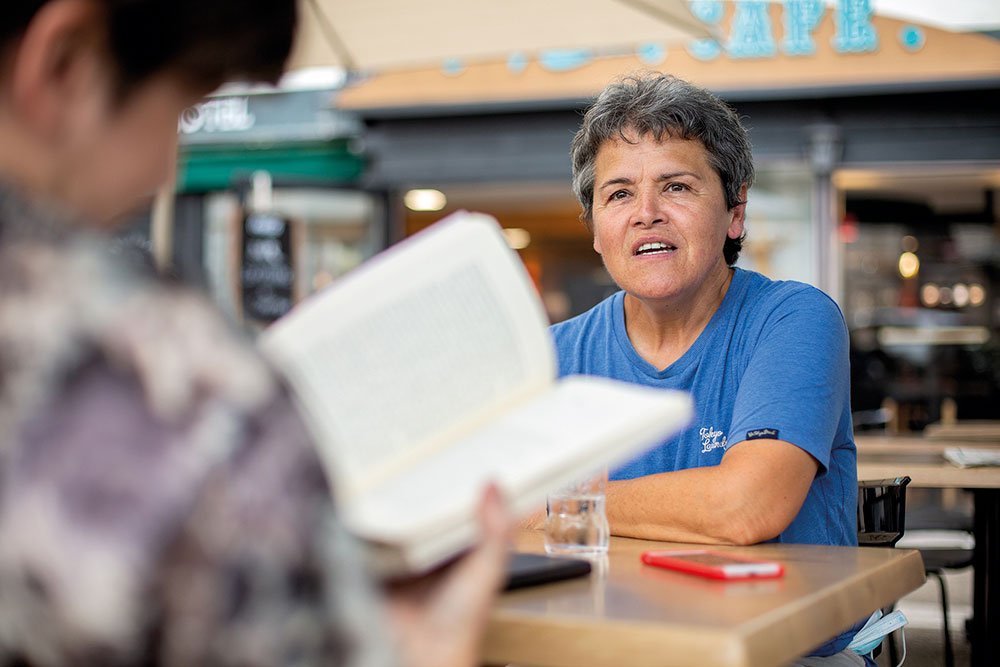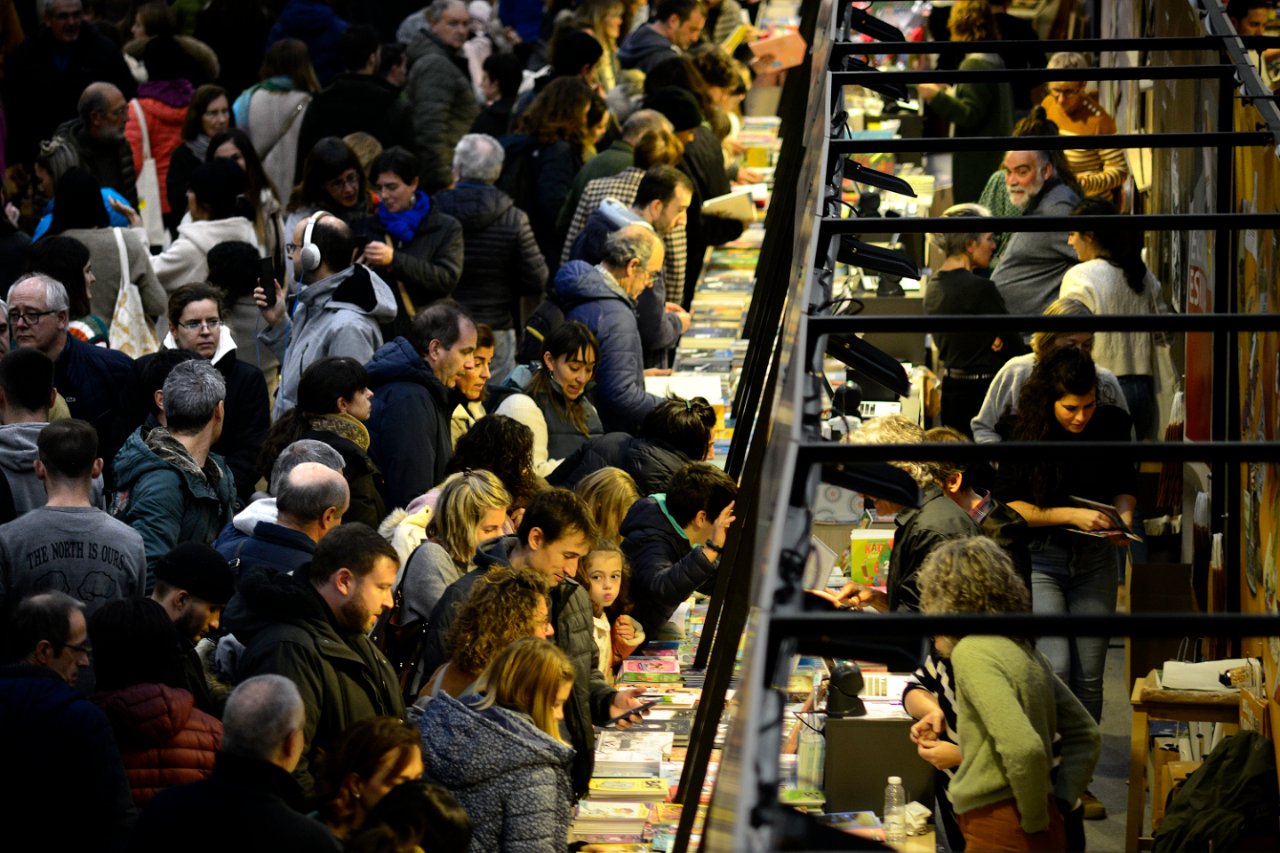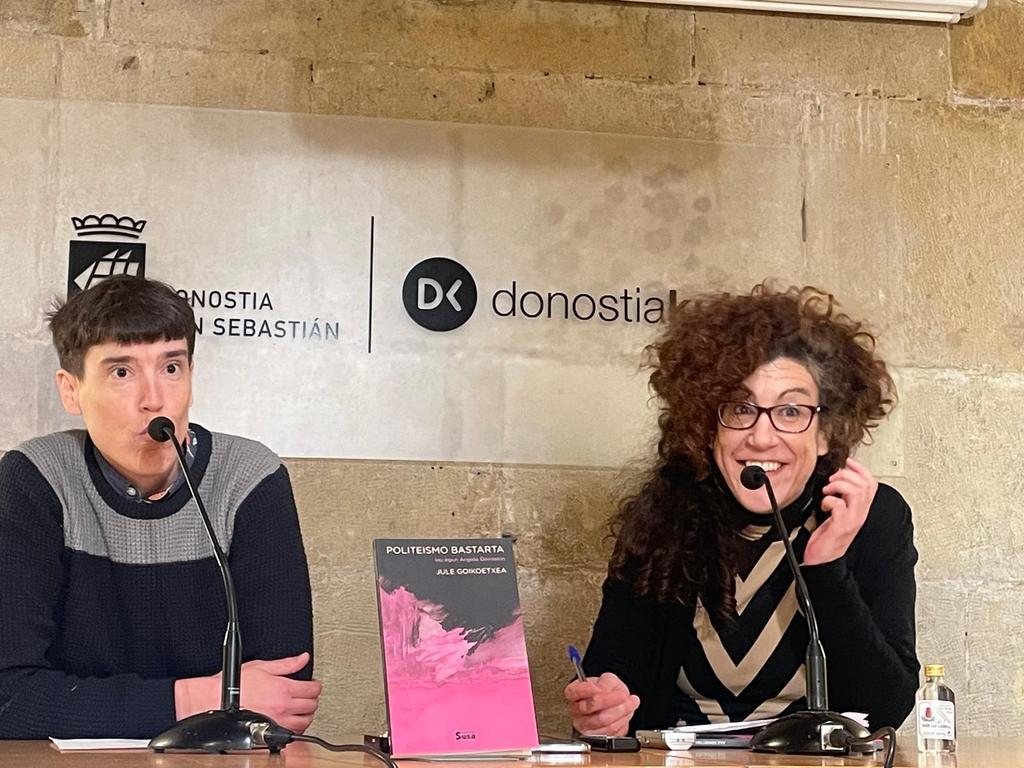“Language is exactly the coldest case Amaia Ezpeldoi investigates”
- Detective Amaia Ezpeldoi is ready to retire, but is asked to investigate the disappearance of a woman. We met with Itxaro Borda to talk about the novel Euri zitalari (Susa, 2021).

After three decades of literary career, Amaia Ezpeldoi has come to retire.
He has arrived, yes, although he does not know whether he will respect the laws of retirement.
He imagined him a peaceful retirement, on a mountain in Zuberoa, with his lover.
That's it, and with wifi connection. I believe that in recent years this dream exists in Basque society, each meeting in its core, so that it may be the family, so that it may be the couple, and living in an idyllic place, with power in a corner of the north or of the Baztan.
When did you start writing this book?
2019 final.
And what did the pandemic catch you in?
Chapter four. At first.
Even if there are signs, it does not speak of urgency.
I have not introduced it directly. Although the era of the pandemic has been harsh, it seemed to me that in this novel I did not need priority, because it will happen, and surely many writers will speak differently.
Remember how you came up with creating the character?
I created it in the same way as other characters around the world. In Euskal Herria there were also detectives, for example, in the novel Bakean ützi arte, in the first volume of the series of Amaia Ezpeldoi, appeared Haitz Zumeta, character of the book The New Plague of Gotzon Garate. In addition to this genealogy, I already had another researcher, created for a week-long series that I recorded when I was at Decks Irratia: Amaia Sheridan. It was American, which is obvious [laughs]. Then, when I moved to live in Zuberoa, there was this pipeline affair, which divided the country into two, and I was enjoying – niume, it was not a collective question – how to keep the debates of the time, the facts, the demonstrations… And just there came the evidence of Amaia Ezpeldoi, and then, when it comes to writing the collective problems, I have always used that character that alter ego.

Black novels are characterized by attention to social concerns.
It's a way of changing social concern. Now the black novel is 80 percent of the books that we see in our bookstores, but in the 1990s it was the other way around, it was only 20 percent and it was an undervalued genre. In France they were called Roman de quai de gare, station novels: take, read on a trip and it's already there. Now, on the other hand, gender has gained strength, because the experiences of ordinary people do not appear on the pages of the novels “honorable”. They are more bourgeois, stories of a couple or family, closed, of a triumphant social class. If you want to read what happens in a banlieue from France or from Spain or from Bilbao, you read a black novel. They have the ability to enter different layers of society and, above all, they do not judge what happens, although Amaia Ezpeldoi commits them randomly and perhaps in excess.
In this case, you have been concerned about violence against women, girls and boys and family violence.
[André] Script said: “The family, I hate you.” I would say that Amaia Ezpeldoi doesn't want much of his family in relation to his story, or the stories of others he listens and listens to.
Did you have a specific starting point to create a plot?
It had a hanging story. He worked in the mail and once came, in the area of Hazparne, a woman who could not leave the house for six years, to whom his mother-in-law prohibited him. It was freed or freed spontaneously. We were two or three times and I noticed their comments and testimonies. It is a common theme, it has happened many times, and what I wanted to deal with, through fiction, from two points of view: the sympathetic family and the seductive malign family. Both are bad, bad, in families this ambiguity always occurs. We never know who he is and what he does. And in our families the same thing...
"This ambiguity always occurs in families. We never know who he is and what he does. And in our families the same thing..."
Something terrible happens next to our house and we don't realize it.
I don’t know what brings us to this blindness, and when we realize we also remain silent, we don’t enter, for example, in the maternal-infant riots on the streets, we don’t put anything… We strip ourselves, but we don’t do anything. I don't know whether it's natural or not, whether it's attempts to stop ourselves, but it is. And I wanted that to prove it, too, that we don't see everything, even though we think our discourse is omniscient.
It makes a lot of references to socio-political actuality.
I realize that every episode of Amaia Ezpeldoi is the finger or shadow of a historical testimony.
"The same thing that the bourgeoisie has done with the French since the sixteenth century cannot be done with the Basque, that is to say, coerce, clean and more regular"
“I mixed words from childhood and dubious neologisms,” says Amaia. That wealth is one of the characteristics of his writing.
I want to play with language, I've always had that tendency. I often play with a great irony, I like to create contrasts, and our language has the advantage of having an opening: take all, with open arms. We worship the word of any language, which is useful to us, and I think we deny the breath to the language if we do not take it in front of us. The same thing that the bourgeoisie has done with the French from the 16th century until now, we cannot do with the Basque people, that is, coerce, clean and even more regular. It will be done and done, but there are still those who denounce or oppose, social or gender, this coercion in Basque society, and that is what appears in the thread of the novel. There is a linguistic bubble of this kind, which is especially reflected in the wedding chapter of Mango and Dora.
.jpg)
In this same chapter, Juana says that those from the South “are increasingly moving further away” from the Basque Country of Iparralde, and some paragraphs later the word “acronym” appears.
The mesannoxe is natural and you can go to the Iparralde dictionary, as if it were a word in Basque, and I'm sure it's happening, why not a "tablenuita," then? Today it seems that the only model of the Basque Country is that of the South, that of the North is being sent to the level of a boring “patois”. The novel also merges games related to the Hitan, the drained, the compact... The language, in these novels, appears as another married body.
Has your attitude to language changed?
I think it has been a road, I have started by the most demanding dialects of our East and I have come to the sum of posts in Basque, to that curious Basque salsa. It's the joke I pull out when I'm in shape, forgive! Perhaps in all novels the language is precisely the most innermost case that Amaia Ezpeldoi investigates: it passes from one dialect to another, then in his own way, enriching it always, and in the latter it becomes a crucible that integrates all forms of Euskera.
It has also done so geographically.
He has investigated the whole of the Basque Country and goes to Landeta. The fields are artificial jungles, created by the planting of pines in the lagoons of the time; they have a special history, an interesting ecosystem, and if you want to include an American air in the novelty production of Euskal Herria, we need that space.
The protagonist of Mea Culpako, of Uxue Apaolaza, flees there.
Not just him. Landak also appeared in Miren Agur Meabe's book "Kristalezko begi bat." If that is where the Basque franc comes from during the long weekends. That is why I, too, allow myself this leak.
"[Amaia Ezpeldoi] has spent a long time without clarifying her sexual identity, as most of us have done for centuries."
At the end of the survey, Amaia is helped by her friends and lovers. I've represented it as a network of lesbians scattered here and there.
That's the idea. Amaia Ezpeldoi had no network of friends until the comingout. In the first book we see him with a child, then he makes the knowledge of Joana Garralda, and from there he goes mostly with his wives. It has remained for a long time without clarifying its sexual identity, as most of us have done for centuries. Now, on the other hand, she speaks of lesbian with a loud voice, thus reaching the LGBTQI+ networks, moving away from her initial melancholy solitude.
I'd like to talk about skin.
This novel was made by the illustrator friend Ainara Azpiazu, who summarizes the soul of the book. All surfaces have been made by artists, Garbiñe Ubeda the first, Asisko a par and Unai Iturriaga the one by Boga Boga Boga. The titles are fragments of Basque songs, forming a single melody between the traditional and the modern song.
.jpg)
What meeting do you do?
For me it has been an incredible experience, I have been through all the situations, I have been alive and I have also survived Amaia Ezpeldoi, even though it has often been very committed everywhere. Now that she goes with her lover to live with her, Madalena can be the symbol of another situation that lives in Euskal Herria. New times are opening up, and on top of others it will also be investigating the cases of corruption and murder that will emerge!
Are you sure it's over?
Yes, I think so.
You also retired, but you have not gone to live on a mountain.
And I won't go. I need the city. Even though I live alone, I love the community that's here, especially in San Izpiritu, because I think I'm in the middle of the world.
Do you write more since retirement?
As before. I've always written a lot, perhaps too much, because I was afraid I didn't have time, I've struggled in a situation of anguish, as if it were no future. It is curious, now I have no feeling, I know I will deny the time.
Why?
I don't know. Maybe age. Prudence deriving from age.
Have you been writing anything in Usurbil, no?
Yes, I've spent three weeks there, with a scholarship from Udalbiltza, and I've rooted my story in the village and around.
Do you have something else in your hands?
Not at the moment. I've been lazy. Because I don't have pressures right, I don't feel like I have to germinate. Before, we feared the world would disappear, we acted in apocalyptic environments, and we are aware that there are still different ideas for the construction of language and society; they change but they do not disappear.
Joan Tartas (Sohüta, 1610 - date of unknown death) is not one of the most famous writers in the history of our letters and yet we discover good things in this “mendre piece” whose title, let us admit it from the beginning, is probably not the most commercial of the titles... [+]















ilbeltza-(1).jpg)









.jpeg)